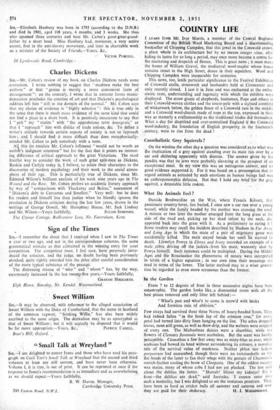Charles Dickens
SIR,—Mr. Cohen's review of my book on Charles Dickens needs some .correction. I wrote nothing to suggpst that " madmen make the best authors " or that " genius is merely a more convenient form of derangement "; on the contrary, I wrote that in extreme forms manic- depression precludei the creation of art and that Dickens's psychological oddities left him " still in the domain of the normal." Mr: Cohen says that my choice of evidence is "highly selective ": this is true only in the sense that there is much more evidence of the same kind that could not find a place in a short book. It is positively. inaccurate to say that I " pelt " my " victim " with. " the opprobrious term - bourgeois," or that I " reproach" him with dislike of trade unions, &c. To define a; writer's attitude towards, certain aspects of society is not to reproach him ; and I should find. it ,more difficult than does- metaphorically-. minded Mr. Cohen to pelt- somebody with a term. All this (to emulate Mr. Cohen's loftiness) " would not be worth an authOr's indignant attention" but for the fact that it points an interest- ing difference of critical approach to the great Victorians. The most fruitful way to consider the work of such great split-men as Dickens, Ruskin and Carlyle today is, I believe, to relate their characters to the discoveries of modern psycholcigy and their work to the social atmos- phere of their age. This is particularly true of Dickens, since Mr. Edmund Wilson's brilliant analysis of his work nine years ago in The Wound and the Bow. Mr. Cohen prefers an academic literary approach by way of " comparisons with Thackeray and Balzac;" assessment of "Dickens's debt to Cervantes and Smollett." Very well: but he does his readers and himself less than justice when he blandly ignores the revolution in Dickens criticism during the last few years, shown in the -writings of George Orwell, Mr. Humphrey House, Mr. Jack Lindsay


































 Previous page
Previous page